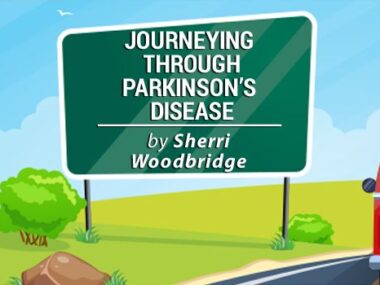Reframing our thoughts can be a useful tool in navigating Parkinson’s
A different perspective can make adapting to change easier
Written by |

I was in line behind a young mother at the grocery store last week. She was probably in her early 40s and had three beautiful children in tow. The line moved slowly, so I was stuck listening to her lengthy cellphone conversation. She was loudly discussing her problems and focusing on the difficulties of driving her kids to their activities, play dates, and school drop-offs and pickups.
I didn’t think much of it until I got into my car alone. I looked in my rearview mirror, and nobody was in the back seat. I looked one more time in hopes they would appear — “they” being my kids. No such luck; I was alone.
That got me thinking about the woman in the store. I’m not one to judge others, and I have no idea about this woman or her life. But as I drove home alone, I wished (selfishly) that I could have more driving time with my kids, who are now adults. I wished the woman at the store would realize how precious and fleeting those moments are. Some of my most meaningful conversations with my children were held in the car. Without the pressure of direct eye contact, kids are more likely to open up and be honest. And don’t even get me started on the fun of driving their pals around town. Pure joy.
I then started to consider the importance of our view. You may be faced with many different types of problems in your life, from chronic illness to a debilitating diagnosis, or even the stress of driving young children. No matter what your issues are, you see them through your own lens.
But viewing our problems through a different lens can change everything. When we adjust the way we think about and respond to stress, it’s called reframing. You may begin to view something like sitting in traffic as an opportunity to listen to music, podcasts, or books, or enjoy the pleasant views. That woman could view the “annoying” time spent driving her children as a moment she’ll never be able to get back or replace, and become thankful for it instead.
Saying “I get to …” is another way of reframing our thoughts. When driving your car, did you ever stop to think that some people aren’t physically able to drive? Or that many aren’t able to afford a car and auto insurance? Instead of agonizing about how tiring driving is, you can adjust your thoughts and consider how lucky you are to have a car and be able to drive. Rather cool, huh?
Adjusting our perspective on Parkinson’s
Parkinson’s disease changes everything, no matter your age or stage of life. So much of what is lost may have been taken for granted before the diagnosis. Everyday activities such as cutting your own food, getting dressed independently, and driving are among the many skills eventually lost due to Parkinson’s. How can we reframe those losses to make acceptance easier?
My husband, Arman, who was diagnosed at age 38 with early-onset Parkinson’s disease in 2009, tries to see the bright side of those losses. While he misses the independence of having his own car and the freedom to go places alone, he jokes that we are like the movie “Driving Miss Daisy,” with him being Daisy (the passenger) and me being Morgan Freeman’s character (the driver). He uses humor to reframe his thoughts and find joy in our time together on the road. In addition, he immediately falls asleep in the car, which would not be safe if he were driving!
There are many strategies and ways to reframe your thoughts to help you get through tough times in life. When you find the best tool that works for you, use it, and use it often. While it won’t change the diagnosis or the future, it may make life a little easier along the way.
Note: Parkinson’s News Today is strictly a news and information website about the disease. It does not provide medical advice, diagnosis, or treatment. This content is not intended to be a substitute for professional medical advice, diagnosis, or treatment. Always seek the advice of your physician or another qualified health provider with any questions you may have regarding a medical condition. Never disregard professional medical advice or delay in seeking it because of something you have read on this website. The opinions expressed in this column are not those of Parkinson’s News Today or its parent company, Bionews, and are intended to spark discussion about issues pertaining to Parkinson’s disease.




Leave a comment
Fill in the required fields to post. Your email address will not be published.